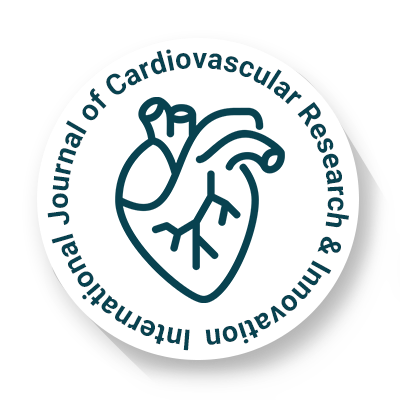
International Journal of Cardiovascular Research & Innovation
OPEN ACCESS

OPEN ACCESS
Vascular biology is fast fast-moving discipline that investigates the complex network of blood vessels and emphasizes their structure, function, and the diverse molecular processes that regulate their activity. The vascular system is essential in human physiology as it is responsible for delivering oxygen, nutrients, and immune cells and allowing waste removal. Impairment of the vascular system will result in a range of cardiovascular diseases, and hence it is an important area of research in medical science.
Vascular biology’s cornerstone is the endothelium, a monolayer of cells that lines blood vessels and functions as a gatekeeper, modulating permeability, inflammation, and blood flow. Endothelial dysfunction frequently leads to atherosclerosis, hypertension, and thrombosis. Research on vascular biology has given important insight into the mechanisms by which lifestyle, genetics, and environmental determinants affect vascular health.
Another critical field of vascular biology is angiogenesis or the development of new blood vessels from pre-existing ones. This physiological phenomenon is crucial for growth, wound healing, and tissue repair. Pathological angiogenesis, however, is responsible for many diseases, including cancer, diabetic retinopathy, and chronic inflammatory disorders. Scientists are constantly seeking ways to control this process for therapeutic purposes, such as inducing vascular repair after ischemic injuries or inhibiting unwanted blood vessel growth in tumors.
The intersection of vascular biology with emerging biomedical technologies has established new fields in biomedical research. Development in nanomedicine, tissue engineering, and regenerative therapy are formulating new paths of therapy in vascular diseases. For example, bioengineered vessels and site-specific drug targeting are transforming strategies in repairing vascular malfunction and enhancing patient benefits. Inflammation and oxidative stress are the major contributors to the pathogenesis of atherosclerotic vascular diseases. Chronic inflammatory conditions can compromise the integrity of the blood vessels, leading to conditions like aneurysms and peripheral artery disease. Elucidation of the molecular mechanisms of these events has helped in the development of anti-inflammatory and antioxidant interventions to preserve vascular integrity.
Moreover, the relevance of vascular biology to neurovascular and metabolic disease is increasingly being recognized. Disorders like stroke, dementia, and diabetes mellitus have significant vascular components, and recent research is revealing new links between cognitive impairment and vascular dysfunction. Clarification of these links is essential for the design of preventive and therapeutic approaches.
The International Journal of Cardiovascular Research & Innovation is dedicated to the dissemination of high-level research for improved vascular biology knowledge. By facilitating scientific discussion, the dissemination of pioneering results, and the promotion of interdepartmental collaboration, we aim to contribute to the constant evolution of emerging challenges and opportunities in the field of vascular biology, this journal is dedicated to facilitating innovation and the application of research to clinical practice for the improvement of patient care worldwide.